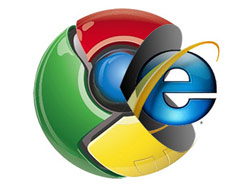Back in June we were announcing that the Beta version of Google Chrome Frame had been released. We are now glad to announce that the Beta is old news and that Google Chrome Frame no longer carries the Beta tag. That’s right, Google Chrome Frame has been released as a final, stable version.
“Today, we’re very happy to take the Beta tag off of Google Chrome Frame and promote it to the Stable channel. This stable channel release provides our most polished version of Google Chrome Frame to date, allowing users to access modern web technologies like HTML5 on legacy browsers” announced yesterday Software Engineers Tomas Gunnarsson and Robert Shield.
Google Chrome Frame is an open-source plug-in that gives legacy browsers HTML5 compatibility and faster JavaScript. Instead of legacy browsers read IE6, IE7, and IE8. By using Chrome Frame the user can run whatever Chrome can run, just that he does it in a legacy browser – which is great news for web developers who felt that legacy browsers were holding them back by not allowing them to develop with HTML5. Keep in mind that IE6, IE7 and IE8 (Internet Explorer 8) do not provide HTML5 support. It’s only IE9, which has recently been released as a Beta, that provides HTML5 support.
The first time we heard about Google Chrome Frame was in the autumn of 2009, when Mountain View-based search engine giant Google rolled out a developer preview. At the time of the launch, Redmond-based software giant Microsoft did not take kindly to Chrome Frame. Microsoft officially recommended that users stay away from the plug-in because it has a negative image on IE’s security. Mozilla then jumped in an agreed with Microsoft. Google responded by saying Google Chrome Frame, which is still in early development phase, is being developed with security in mind.
Well, Google Chrome Frame is no longer in an early development phase – it is now a stable, final version. This means it plays nice with other plug-ins and starts three times faster on Windows Vista and Windows 7, compared to the Beta version.
“Google applications like Orkut, Google Docs, and YouTube have already begun adding Google Chrome Frame support. Gmail and Google Calendar are planning to adopt Google Chrome Frame in the near future to improve performance and ease the transition for users as they drop support for legacy browsers,” said Tomas Gunnarsson and Robert Shield.
The two software engineers explained that in the future the development team will focus on:
- getting Google Chrome Frame to start even faster and
- removing the current requirement for administrator rights to install the plug-in.
All future Google Chrome Frame updates will be released on the same schedule as Google Chrome.
To get started with Google Chrome Frame, just click here.
“Today, we’re very happy to take the Beta tag off of Google Chrome Frame and promote it to the Stable channel. This stable channel release provides our most polished version of Google Chrome Frame to date, allowing users to access modern web technologies like HTML5 on legacy browsers” announced yesterday Software Engineers Tomas Gunnarsson and Robert Shield.
Google Chrome Frame is an open-source plug-in that gives legacy browsers HTML5 compatibility and faster JavaScript. Instead of legacy browsers read IE6, IE7, and IE8. By using Chrome Frame the user can run whatever Chrome can run, just that he does it in a legacy browser – which is great news for web developers who felt that legacy browsers were holding them back by not allowing them to develop with HTML5. Keep in mind that IE6, IE7 and IE8 (Internet Explorer 8) do not provide HTML5 support. It’s only IE9, which has recently been released as a Beta, that provides HTML5 support.
The first time we heard about Google Chrome Frame was in the autumn of 2009, when Mountain View-based search engine giant Google rolled out a developer preview. At the time of the launch, Redmond-based software giant Microsoft did not take kindly to Chrome Frame. Microsoft officially recommended that users stay away from the plug-in because it has a negative image on IE’s security. Mozilla then jumped in an agreed with Microsoft. Google responded by saying Google Chrome Frame, which is still in early development phase, is being developed with security in mind.
Well, Google Chrome Frame is no longer in an early development phase – it is now a stable, final version. This means it plays nice with other plug-ins and starts three times faster on Windows Vista and Windows 7, compared to the Beta version.
“Google applications like Orkut, Google Docs, and YouTube have already begun adding Google Chrome Frame support. Gmail and Google Calendar are planning to adopt Google Chrome Frame in the near future to improve performance and ease the transition for users as they drop support for legacy browsers,” said Tomas Gunnarsson and Robert Shield.
The two software engineers explained that in the future the development team will focus on:
- getting Google Chrome Frame to start even faster and
- removing the current requirement for administrator rights to install the plug-in.
All future Google Chrome Frame updates will be released on the same schedule as Google Chrome.
To get started with Google Chrome Frame, just click here.

























